One of Britain’s premier folk festivals celebrates its platinum anniversary in 2024. MAL ROGERS looks at this year’s line-up
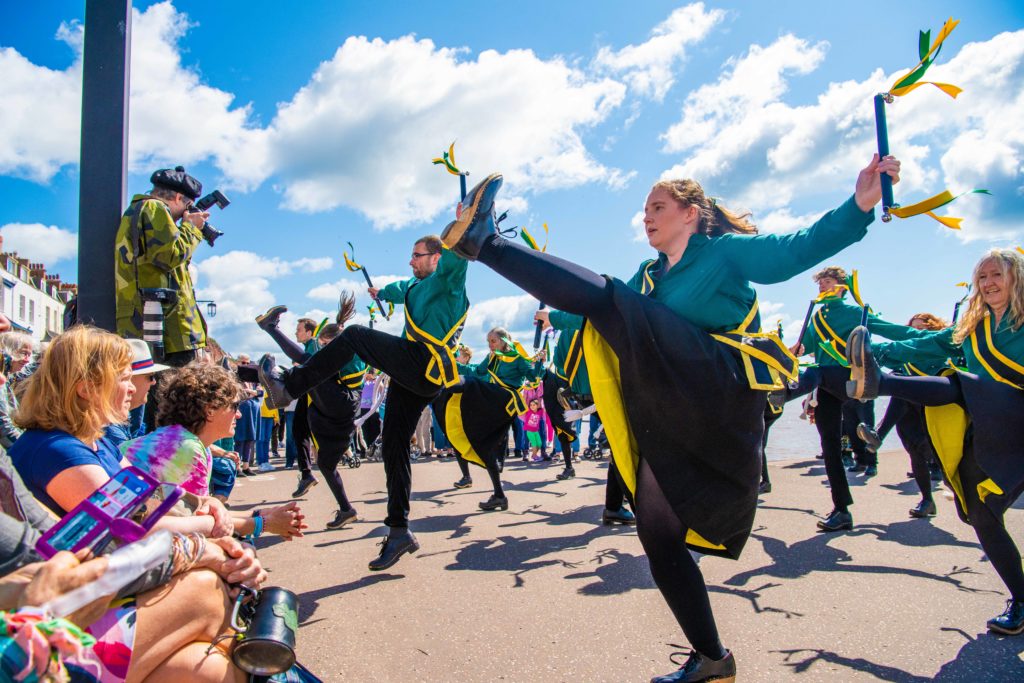
SAMUEL Taylor Coleridge was born in Ottery St Mary, half a dozen miles outside Sidmouth.
Among his most famous lines are:
In Xanadu did Kubla Khan
A stately pleasure-dome decree:
Where Alph, the sacred river, ran
Through caverns measureless to man
Down to a sunless sea.
He possibly wrote the line on the banks of the River Sid, which flows into the English Channel at Sidmouth.
Certainly “Where Sid the sacred rive ran” doesn’t quite have the same poetic pull, put the town of Sidmouth, overlooking the Jurassic Coast, has its own romanticism.
This is truly a slice of Seaside Britain — by rights you should be wrapped up in a tartan blanket and possibly writing saucy McGill postcards — as you listen the very latest 19th century military two-steps being played from the bandstand during the summer months.
Sidmouth has many strings to its bow aside from its brass band, its impressive Georgian mansions, and its Jurassic Coast festooned with fossils. It is home to probably the most famous folk festival in Britain (along with Cambridge).
This year the Sidmouth Folk Festival runs from (August 2-9)
Acts include McGoldrick McCusker Doyle, Blazin’ Fiddles, Kate Rusby, Ralph McTell, Karine Polwart, Oysterband, Spiers & Boden, Chris Wood and Andy Cutting, Martin Simpson, O’Hooley & Tidow, Spooky Men’s Chorale, plus festival patron Steve Knightley and Friends.
Pre-festival shows feature Steeleye Span, Ukulele Orchestra of Great Britain and the Fisherman’s Friends and big nights out at the Bulverton up the hill will be kicking up a storm with acts like Blowzabella, Kinnaris Quintet, Mad Dog Mcrea and the Sea Song Sessions.
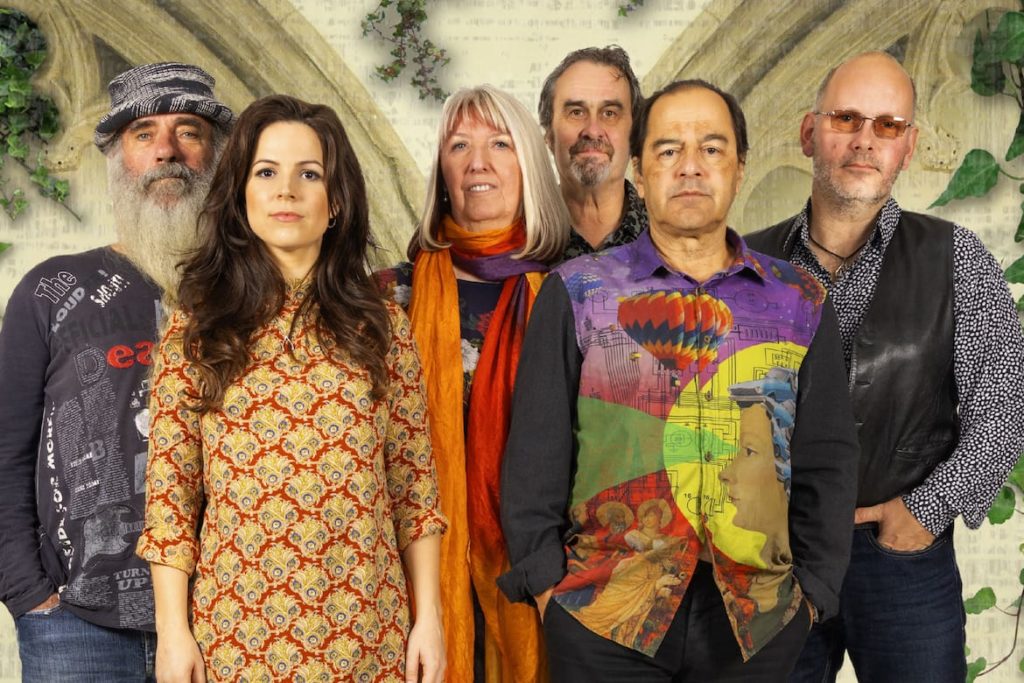 Steeleye Span
Steeleye SpanSteeleye Span
The customary pre-festival Ham Marquee shows for 2024 feature folk rock pioneers Steeleye Span, who helped to define the genre more than 50 years ago.
Maddy Prior is the only original member of the group, whose line-up over the decades has included Ashley Hutchings, Martin Carthy, Tim Hart and Irish duo Gay and Terry Woods.
Another long-serving member is Liam Genockey, the drummer who has been with the band since 1989.
Genockey was born in Dublin, but soon made his way to England, and the burgeoning music scene. In the 1960s he lived in Plymouth, playing in local semi-pro groups and then, in the early 1970s, playing with Torbay-based rock band Adolphus Rebirth. He was one of the founding members of the early-1970s jazz-fusion and Afro-prog band Zzebra, later moving on with fellow band-member John McCoy to join Gillan.
He then participated in Amalgam, formed in 1976 by Trevor Watts. Watts' work covers the spectrum of free jazz, electronic, jazz-rock, space jazz and folk-rock. Watts later founded 10-piece Moiré Music Ensemble which included Genockey again, along with Peter Knight, an early member of Steeleye Span.
In between times he has found time to be Paul Brady’s drummer.
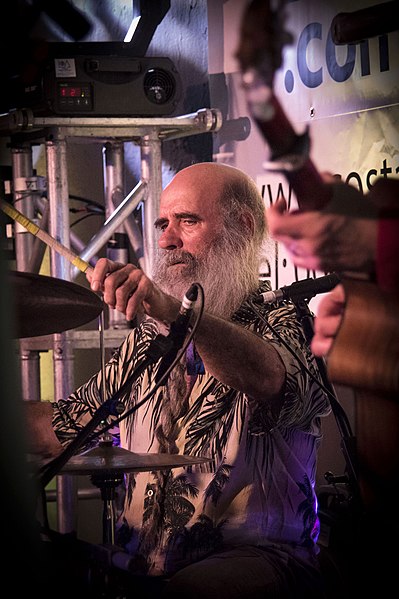 Liam Genockey (image by Bryan Ledgard on Wikimedia)
Liam Genockey (image by Bryan Ledgard on Wikimedia)McGoldrick McCusker Doyle
Traditional musicians Mike McGoldrick, John McCusker and John Doyle, bring their blend of ballads, bonhomie and searing melodies to Sidmouth. All three musicians have enjoyed global acclaim across their career: John Doyle (vocals, guitar, bouzouki, mandola) is an Irish traditional music stalwart, a founder member of acclaimed group Solas, who has worked with Joan Baez, Linda Thompson and Mary Chapin Carpenter.
BBC Radio 2 Folk Award Winner John McCusker (fiddle, whistles, harmonium) has played with The Battlefield Band, Mark Knopfler and Bob Dylan. Born in Scotland, his Irish mother encouraged him to learn to play the fiddle beginning at the age of seven. He had a long association as a member of Battlefield Band beginning in the 1990s and was later a band member and producer for folk singer Kate Rusby.
Manchester-based Mike McGoldrick (flute, whistles, uilleann pipes, bodhrán, clarinet, congas) is a BBC Radio 2 Folk Award winner, founding member of Lúnasa, and current member of Capercaillie. A founder member of Toss The Feather bands, he later co-founded Flook
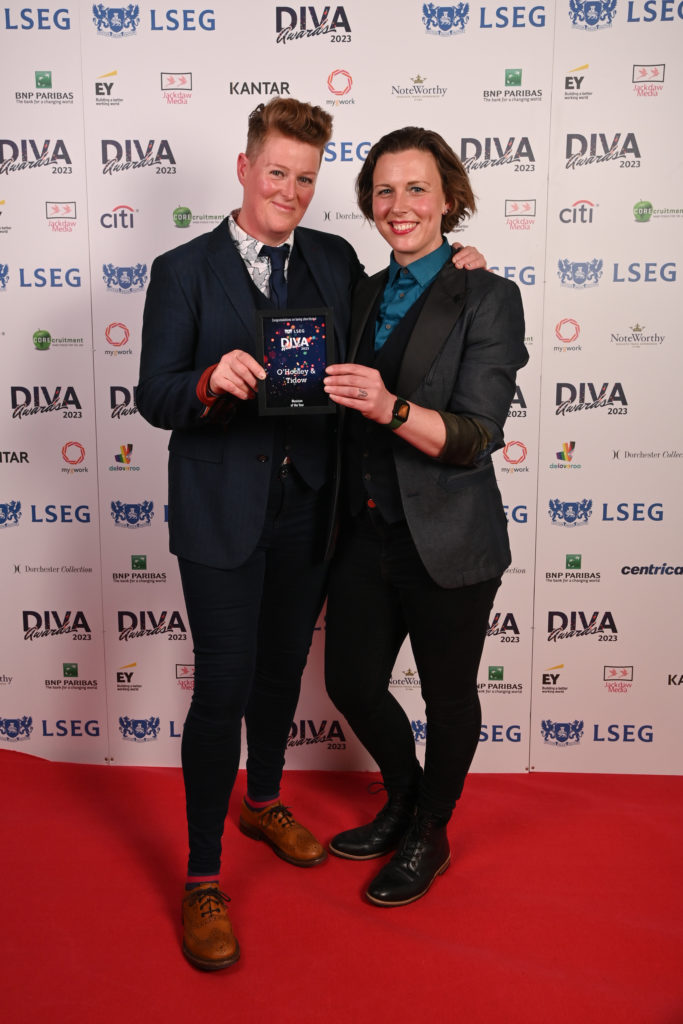 Belinda O'Hooley-Tidow and Heidi O'Hooley-Tidow (Photo by Eamonn M. McCormack/Getty Images)
Belinda O'Hooley-Tidow and Heidi O'Hooley-Tidow (Photo by Eamonn M. McCormack/Getty Images)O’Hooley and Tidow
Belinda O’Hooley and Heidi Tidow are a Yorkshire-based songwriting duo who have been crafting unconventional, wryly observant and melancholy folk songs for more than ten years.
They both have Irish family backgrounds, although Heidi also has German roots.
On Folk Radio Belinda O’Hooley spoke about the influence that their Irish roots have had on their music. “Our Irish backgrounds have a massive influence on our music. From the melodies to the topics, to our traditional song choices. Come Down from the Moor explores the parallels between post-Famine Ireland and austerity Ireland, with my great grandmother Anne Murray’s singing interrupted by a call from the future, as her children’s children emigrate to distant lands for work.”
Heidi explained: “My dad’s family originate from Athenry Co. Galway and many of my relatives left Ireland for better lives in America and England. I believe the history of emigration in your blood has a big impact on the soul of your music. The feeling of always moving, the sadness of leaving home and of not fitting in. The Irish were treated with suspicion and prejudice when they started coming to England, which affects future generations of migrant families; similar to how Eastern European immigrants are being treated now. My Oma; Magda was German and used to play the accordion to me when I was a little girl, which has probably contributed to the European flavour of some of our songs. We’ve had comparisons to Brecht and Kurt Weil.”
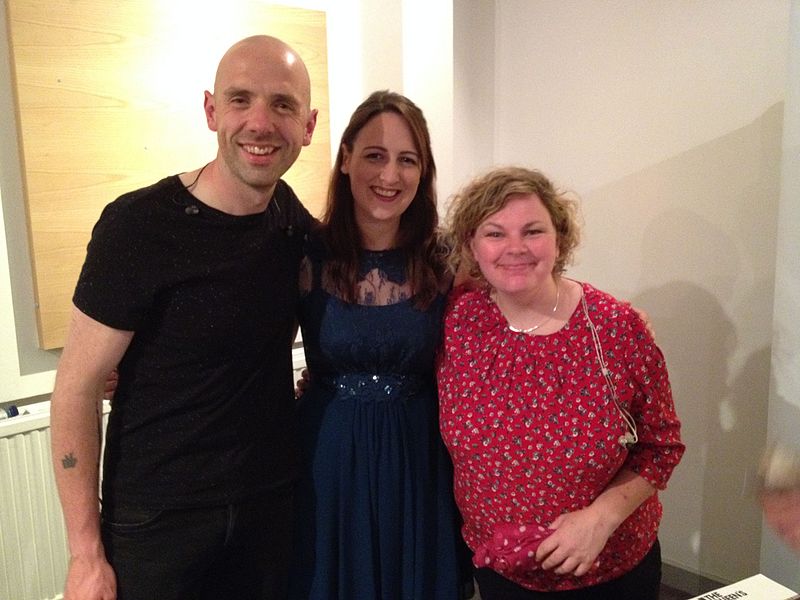 Angus Lyon, Kirstan Harvey and Anna Massie of Blazin' Fiddles (image by Sylvia Stanley on Wikimedia)
Angus Lyon, Kirstan Harvey and Anna Massie of Blazin' Fiddles (image by Sylvia Stanley on Wikimedia)Blazin’ Fiddles
Formed in 1989, Blazin’ Fiddles are from the Highlands and Islands of Scotland. They mix the very specific (and hugely attractive) fiddling style of the north of Scotland with empathetic piano and guitar arrangements.
Their name has no country & western overtures (like, as in Blazing Sadlles). Rather, it has a more sombre allusion — the practice in the 19th century that the Church of Scotland had of burning fiddles, so that people might get into heaven more easily.
Whether the plan worked or not, no one can say until someone reports back from the Afterlife; what we can say is that Blazin’ fiddles produce music that sounds so incredibly good that it probably is wicked. The band manages to capture Scottish fiddle music’s unique variety, energy and sensitivity like few other bands have managed.
Each member of Blazin’ Fiddles draws the distinct flavour of music from their various part of the Highlands and Islands. The personnel are drawn from the fiddling strongholds of Orkney and Shetland, as well as Inverness, Nairn, the Black Isle and one from the Lowlands.
The band have taken their music from remote village halls to the BBC Proms at the Royal Albert Hall. Fiddlers Jenna Reid, Bruce MacGregor, Rua Macmillan and Kristan Harvey are joined by Anna Massie on guitar/fiddle and Angus Lyon on piano to deliver a musically intoxicating evening.
Martin Simpson
Lincolnshire man Martin Simpson is widely regarded as one of the greatest guitarists playing in Britain or America. His music reflects a wide variety of influences and styles, rooted in Britain, Ireland, America and beyond
Over the years he has collaborated with Bonnie Raitt, Richard Hawley, Jackson Brown, June Tabor, Richard Thompson and many more.
Simpson has been a musical phenomenon since his early teens; his partnership with June Tabor in the 1970s and 1980s brought him to the attention of a wide audience and led to him being courted by the world of rock, which he sidestepped.
Instead, he headed for the US, where he spent twenty years immersing himself in the great music traditions of America. It was here he perfected, not just his guitar technique, but his banjo playing too.
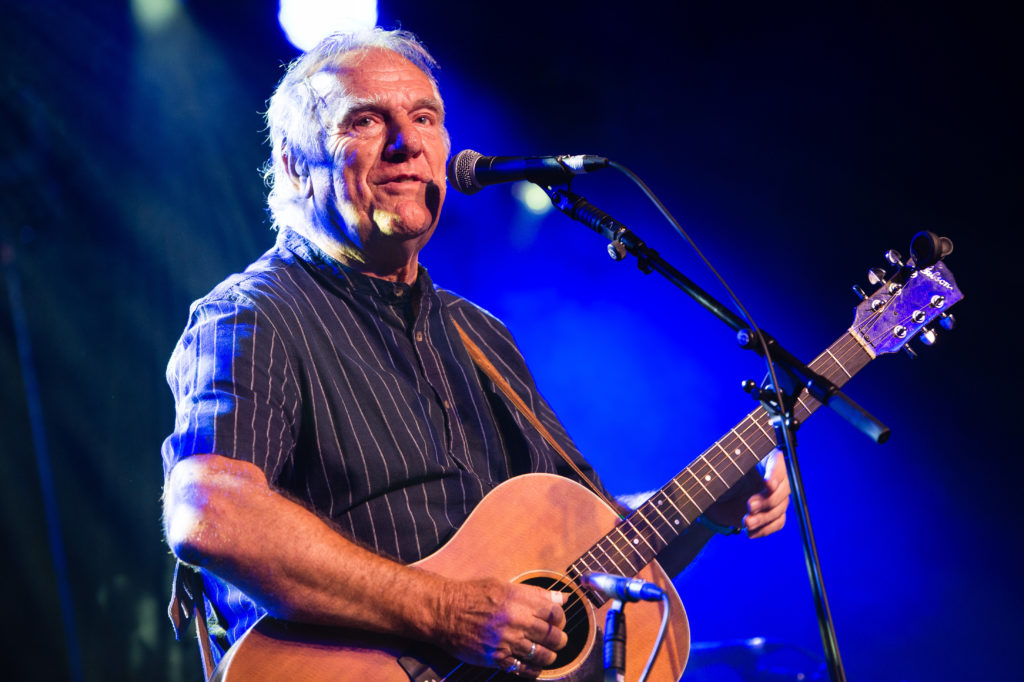 Ralph McTell (Photo by Jeff Spicer/Getty Images)
Ralph McTell (Photo by Jeff Spicer/Getty Images)Ralph McTell
Will he sing The Streets of London in Sidmouth? Yes, Ralph probably will. And although you might have heard it a thousand times it still has the ability to sidle up to you and say, this is actually very sad. You might have heard it before, but this is reality for some people.
The Streets of London has epic emotional impact, but it doesn’t beat you over the head.
Ralph’s big number from the Irish perspective, is of course It’s A Long Way From Clare To Here. This song was written from hard experience. “I was working on the buildings,” explained Ralph in an interview with The Irish Post, “and there was a young lad called Martin from Sligo. I was about 18, and he was about 15 - passing himself off as an 18-year-old.
“I could tell it was hard for him to fit in, and I remember chatting with him to see if I could help him, whether he liked life in London. ‘Ah,’ he replied, ‘’Tis a long way from Clare to here.’ The phrase really stuck with me because it was a strange way of putting it. Most English would say something like it’s a long way from here to Croydon. But no, Martin’s first thought was his home - it’s a long way from Clare. “The song is just a lament for those guys who worked on the Lump, and who found that when they came here old habits from home die out - like going to Mass- all your time is consumed with back breaking work.
“And the song, A Long way From Clare To Here — the Irish have changed it! Stuck in an A minor. When I play it in Ireland I have to ask them to let me sing one verse and chorus on my own, before they join in. In time-honoured fashion they’ve made the song their own idea of what an Irish song should sound like.”
He added: “But I’ve always been intoxicated by the spirit of Irish music. All countries have folk music. But I’ve never come across a music which encompasses all elements such as passion, bravado, emotion in such large quantities. It truly is unique.”
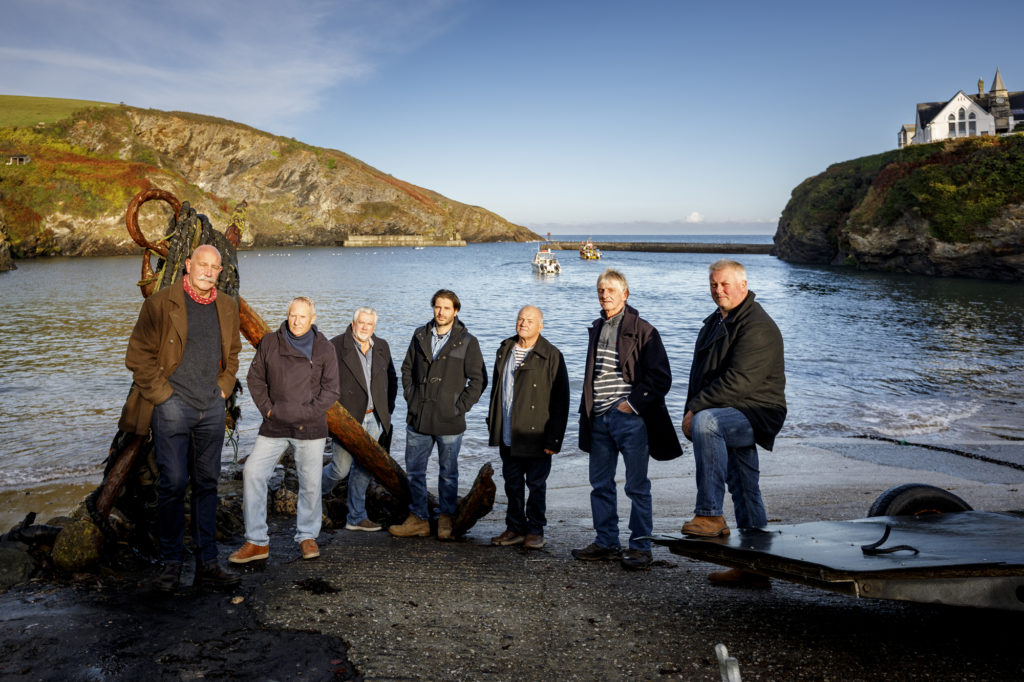 Fisherman's Friends
Fisherman's Friends
